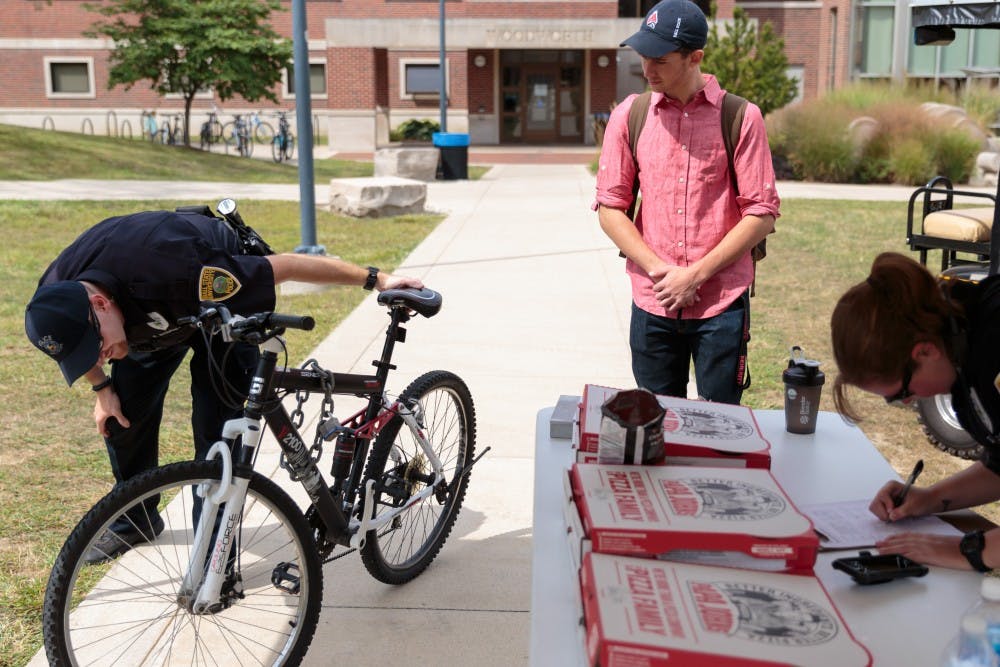She locked only the tire of her bike to the rack.
That’s the reason Kianna Blevins, sophomore nursing major, said her roommate’s bike was stolen.
“They just took the bike off the tire and took the rest of the bike and left the tire,” Blevins said.
Warm weather is an invitation for students to get out their bikes and ride them around campus. However, spring sunshine also attracts uninvited people — bike thieves.
Cpl. Travis Stephens of the University Police Department (UPD) said bikes are stolen at random, not targeted. He said thieves’ favorite targets are bikes with “inferior locks” — like a padlock or cable locks.
Stephens said at the end of March, UPD arrested a suspect found in possession of two stolen bikes. The suspect was riding one of the stolen bikes as he peddled to the front of Hargreaves Music Building to steal a second.
Stephens said a call came into dispatch as the suspect was attempting the second offense, and police responded within a couple of minutes to make an arrest.
UPD offers students the opportunity to register their bikes. Stephens said four years ago UPD only registered 30 bikes in a whole year, but this school year the department registered “just short of 400 bikes.”
After a bike is registered, Stephens said they use the serial number on each bike to track it and verify if it belongs to the actual owner.
“A couple summers ago we recovered a bike in Colorado,” he said. “The police department there ran the serial number, because it also gets put into the national database, saying it was stolen.”
Besides registering bikes, Stephens recommends using a U-bolt style lock -- a lock with a U-shaped bar and a steel crosspiece that costs around $25 to $30.
“In my nine years I’ve never known [a U-bolt lock] to be cut. It’s usually user error if they do happen to get stolen,” he said.
If a U-bolt lock doesn’t unlock, a machine shop mechanic has to come out to weld or grind the lock off the bike, Stephens said.
“[Say you] went out and bought a $20 dollar bike from a garage sale, which by all means is probably the better idea, don’t bring your $1,000 bike to campus,” Stephens said. “But then they don’t want to lock it up and say, ‘Well, I already spent $20 on the bike so I don’t want to spend 50, 30 or 40 bucks on the lock.’”
Stephens said the culprit is not always convicted, especially if the bike is not registered. He said UPD contacts victims and asks if they want to press charges.
Blevins said her bike has never been stolen. She locks her bike with a cable lock and puts it in the garage of her house. She is also interested in getting her bike registered with UPD.
Jason Allardt, manager at Kirk’s Bike Shop, said the brand of bike is more important to a thief than the style of the bike.
“If there was a style [of bike] that thieves target more than others it would be road bikes over mountain bikes,” Allardt said. “Road bikes generally have a higher value.”
Trek, Specialized, Giant, Cannondale, Electra — those kinds of brands are going to be more popular and better looking than department store bikes, Allardt said.
At Kirk’s Bike Shop, all bikes have a serial number that is registered in the shop’s point of sale system and kept on file with the customers’ information, he said.
“A lot of thieves steal bikes then quickly turn around and sell them to a pawn shop or something like that,” Allardt said. “We [Kirk’s Bike Shop] don’t buy used bikes [and] we don’t pay cash for bikes and most people know that.”
When a suspicious bike does come in, the shop records the serial number and makes sure it doesn’t belong to one of its customers whose bike has been stolen, he said.
Contact Charles Melton with comments at cwmelton@bsu.edu or on Twitter @Cmelton144.




